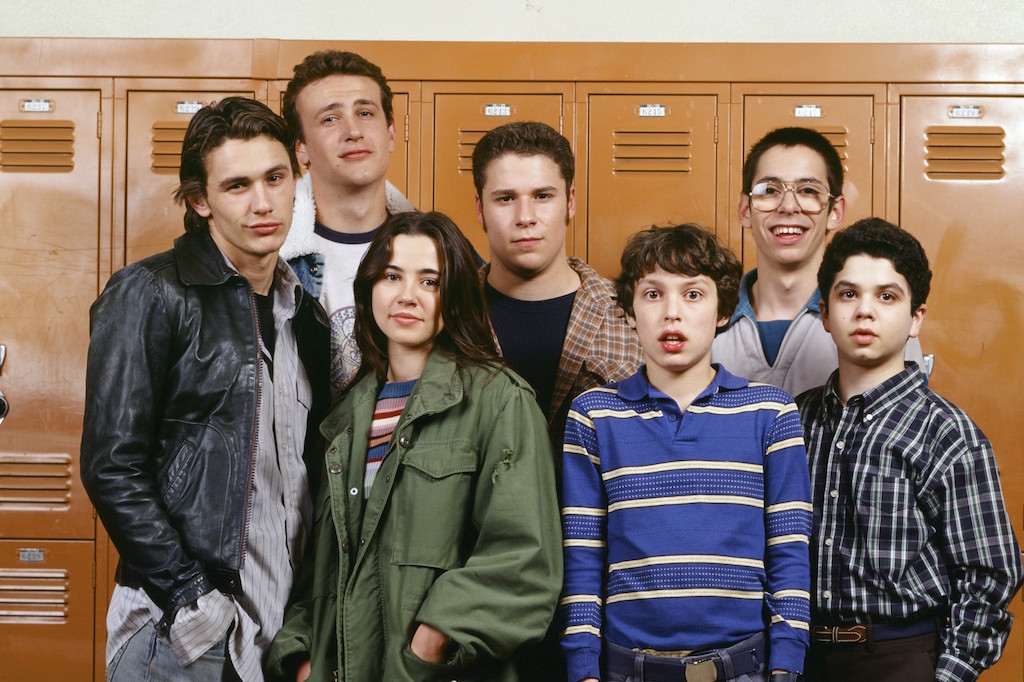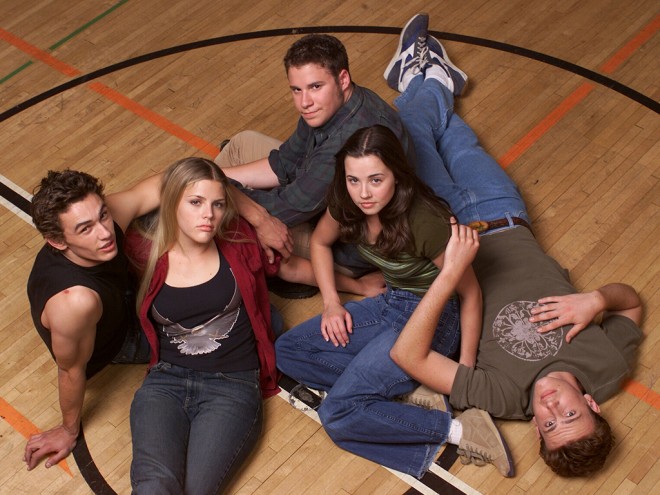Finding Catharsis In ‘Freaks And Geeks’
"I always understood Lindsay's reinvention. As a gay kid growing up in rural Australia, you get pretty good at being someone else."

On a recent night in, horrified to learn he’d never seen it, I convinced my boyfriend to watch the first episode of the short-lived 1999 TV series Freaks and Geeks.
While I hadn’t watched the show in a while, it’s one of my favourites — a high-school drama set in Michigan in the early 1980s, it famously launched the careers of an absurd number of now very high-profile actors including James Franco, Seth Rogan, Linda Cardellini and Jason Segel.
After preparing my boyfriend for the feel-good high school romp I vaguely remembered the series to be, I surprised us both by erupting into intense and audible sobbing in the final few moments of the pilot episode. My face was a mess of tears and snot and, as my boyfriend did his best to comfort me, I remembered the unfortunate fact that this happens to me pretty much every time I watch the show.
The moment that caused my reaction wasn’t even a particularly dramatic one. 14-year-old “geek” Sam (John Francis Daley) has worked up the courage to attend homecoming, and when a slow song comes on he seizes the opportunity to ask the girl of his dreams, Cindy, to dance. Cindy says yes, and Sam gets just seconds of slow dancing before the song (Styx’s ‘Come Sail Away’) shifts abruptly from its piano-ballad opening to a high-energy guitar section.
For a moment Sam’s face falls — picking the wrong song is just another let-down in a long day spent dealing with a violent bully — but then Cindy’s face lights up as she starts to dance. Sam decides to just go with it, awkwardly rocking out as his sister Lindsay (Linda Cardellini), at the end of her own awful day, smiles from across the room.
While the moment’s low-key pathos (something Freaks and Geeks excels at) is always enough to make me cry, it definitely hits hardest in times of trouble.
Transformation and Real Teen Stuff
I kind of hate the internet’s obsession with ascribing every violent world event and celebrity death to the generalised maelstrom of 2016’s apparent evil, as though some anthropomorphic calendar is going around killing everyone from Harambe to Leonard Cohen.
That said, it’s hard to deny a shift in mood. Events like Brexit and the US Presidential election have driven public discourse to a level of violence and vitriol that feels both oppressive and inescapable. Deep breathing before I log onto social media is a woefully inadequate defence against everyone I’ve ever met apparently having transformed into a cardboard cutout attached to a tape-recorder playing recorded lines of self-righteous outrage.
Retreating into pop culture comfort food has helped. I’ve watched more episodes of Star Trek: Deep Space Nine, The Nanny, Bob’s Burgers in just the past month than is probably healthy. I’m also not the only one doing so — in fact, I was inspired to write about this after reading Jessica Friedmann’s excellent essay for Junkee about finding comfort in the Rocky films.
While Jessica’s argument for Rocky is more complex than simply the appeal of ‘comfort food’ (read the damn thing already) I find myself at the end of this year needing, not comfort as such, but exactly what I get from Freaks and Geeks: catharsis. In this case: snotty, unexpected, mildly embarrassing catharsis.
The heart of Freaks and Geeks is 16-year-old Lindsay (with a consistently amazing performance from Cardellini) and I relate to the character to an awkward degree. The pilot begins not long after the death of Lindsay’s grandmother, an event that inspires her to abandon her reputation as a high-achieving ‘geek’ to befriend the school’s ‘freaks’ (played by Franco, Rogan, Segel and the revelatory Busy Phillips), under-achieving stoners just killing time until school ends.
When I was 15 I did pretty much what Lindsay did, for better or for worse, though my own actions probably had more to do with being a closeted gay kid in rural Victoria than the death of a grandparent. I ditched the friends I’d been thrown together with at the beginning of high school to try and carve out something new with my school’s equivalent of the ‘freaks’.
As far as reinventions go it wasn’t completely unsuccessful, but I still understand the impulse. As a gay kid growing up in rural Australia you get pretty good at being someone else. For Lindsay, as it was for me, reinventing herself was part of a tentative process of exploring something that looks a bit more like adulthood. I tried to cope with the existential terror of early adolescence by grasping at the only agency I felt I could claim.

Like most TV shows about teenagers, Freaks and Geeks is a coming-of-age drama about a loss of innocence. The characters, amidst the daily terrors and drudgeries of high school, yearn to escape, but inevitably come to understand that the world of adulthood is just as horrific and much less certain than anything within the school’s walls.
Initially the freaks represent to Lindsay a world of freedom far removed from her privileged but stifling upbringing, but as she gets to know them she comes to see they’re all struggling against the same fears she is. Kind stoner Nick (Segel) imagines a future for himself as a rockstar drummer, but lives in fear of his strict military father. Tough and confident Kim (Phillips) struggles with her disapproving and judgemental mother. Charismatic burnout Daniel (Franco) is desperate to hide the fact that he’s been held back twice at school.
More than any other TV show I’ve seen, Freaks and Geeks takes the tribulations of its teenaged protagonists as seriously as they are felt by the characters. It values their subjectivity in a way that feels unique and special.
One of the show’s most affecting storylines belongs to the ‘geeks’, the group of three friends led by Lindsay’s brother Sam, who acts as Freaks and Geeks’ secondary protagonist. Sam’s friend Neil (Samm Levine) learns his father may be cheating on his mother.
Acting on his suspicions, Neil finds an unknown garage-door opener in his father’s car and takes his friends on a bike ride around the neighbourhood, pressing the button and trying to find its corresponding garage. The search ends late into the night, long after Neil’s friends have gone home, when Neil finally finds the garage door, and his father’s car inside. Devastated, Neil hurls a rock at the car and rides away.
I’m aware that I’m not exactly making a convincing case that the show is something comforting to retreat into. Freaks and Geeks is awkward at best and crushing at worst. But what it excels at is offering moments of, not hope exactly, but small consolations in the face of newfound knowledge that the world is so much more terrifying than you ever thought was possible.
Catharsis and Consolation
To go back to the scene at the beginning, the one that made me cry, what got me was Sam finding a brief moment of real connection — one made possible not just in spite of but because of everything he’d gone through that day. And for Lindsay, just seeing her brother have that moment, knowing what it meant to him, gave her something similar.
It isn’t much, to be sure. But these moments, moments the show excels at, always feel earned.
In a year when I find myself increasingly alienated by the violence of social and political discourse, on social media, on my television screen, Freaks and Geeks is a reminder that we can find each other, even if only occasionally, in the middle of all this bullshit. That small thing is enough to ground me, and enough to allow me to tap into an emotional release I am finding ever more elusive amidst the unreality of the internet’s rage.
Importantly, that release certainly doesn’t come from hope. The world of the show is often a bleak one, but that’s also the point — it feels real. I’m sceptical of hope, of false optimism in the face of how obviously awful a place the world is.
What Freaks and Geeks offers is consolation. It’s the idea that in the face of overwhelming horror, whether it be the institutional terror of high school, the existential uncertainty of adulthood or the daily reminders in the news of our continued death march towards a future of rising economic inequality and certain ecological disaster, we can, on a day-to-day basis at least, take some comfort in the people around us, in the intimacy and connection we make with the others who are going through the same shit that we are.
It’s not hope that things will get better — they almost certainly won’t, at least any time soon — but it’s not nothing. And in the waning days of 2016, for me, it’s enough.
–
Benjamin Riley is a Melbourne-based journalist working in LGBTI health who writes mostly about queer politics and culture, and mental health. He’s also one half of the Queers podcast, and you can follow him on Twitter at @bencriley.”
